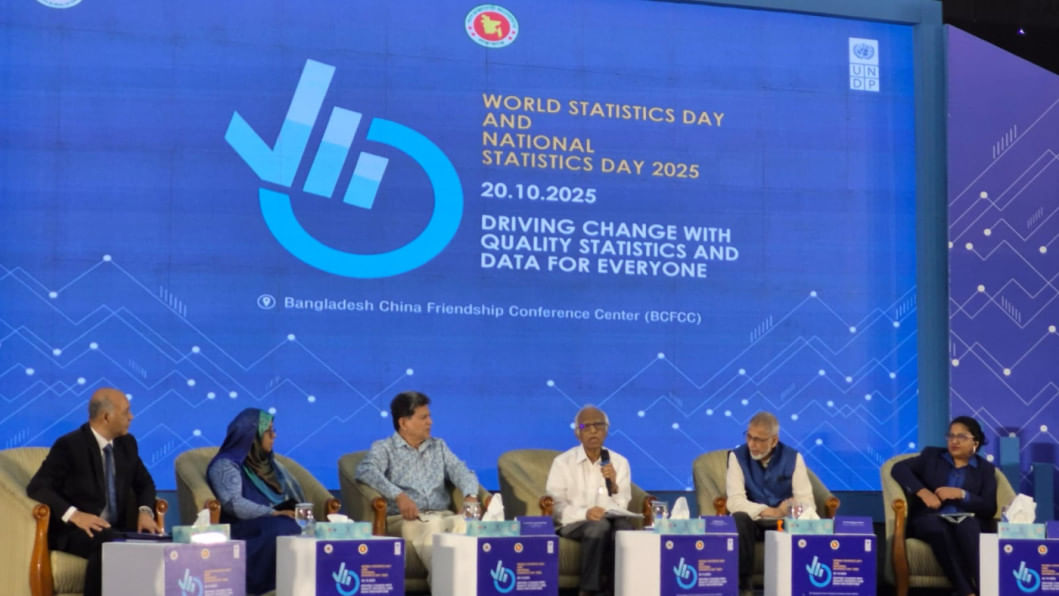Statistics must serve people, not politics: Wahiduddin Mahmud

Planning Adviser Professor Wahiduddin Mahmud today said while there is an ongoing debate over the transparency of public statistics, allegations of manipulation are not always accurate."The claim that public statistics are manipulated is not always true," he said while addressing a programme organised by the Bangladesh Bureau of Statistics (BBS) at the Bangladesh China Friendship Conference Center marking World Statistics Day.He, however, noted a longstanding tendency of successive governments t...
Planning Adviser Professor Wahiduddin Mahmud today said while there is an ongoing debate over the transparency of public statistics, allegations of manipulation are not always accurate.
"The claim that public statistics are manipulated is not always true," he said while addressing a programme organised by the Bangladesh Bureau of Statistics (BBS) at the Bangladesh China Friendship Conference Center marking World Statistics Day.
He, however, noted a longstanding tendency of successive governments to selectively disclose information that aligns with their interests, while withholding data that does not favour them.
"When statistics are released with bias, it constitutes political abuse," he said, stressing the need for the generation of unbiased data and transparent information dissemination.
Mahmud underscored the importance of credible statistics not just for policymakers, but also for the private sector.
"Investors need reliable data on market size and the middle class, who are the main consumers, before making investment decisions. So, generation of credible information is an investment in itself," he added.
Mahmud also emphasised that ethics and adherence to international standards are fundamental to statistical integrity.
Referring to political debates surrounding GDP figures, he said while GDP is a critical metric for planning and policy formulation, there are several other indicators that can also be used to measure the state of the economy.
Anissuzzaman Chowdhury, special assistant to the chief adviser, stressed the importance of quality data in shaping effective, real-time policy.
"Actors across sectors need accurate data to plan their actions. The government, in particular, relies on timely and reliable data to chart its course," he said.
Reflecting on his own experience, Chowdhury highlighted the importance of building a culture of evidence-based decision-making.
"Every dataset tells a story—it's a form of quantitative storytelling. This helps us explore visible options and make informed choices," he said.
He also underlined the necessity for researchers to have access to raw data. "To make meaningful use of statistics, we must reduce the noise and enhance access. Even imperfect data can be valuable if handled properly," said Chowdhury.
Warning against overuse or misinterpretation, he pointed out the risks of information overload and the temptation to draw premature conclusions.
"Too much data, if not processed wisely, can lead to reactive rather than strategic policymaking," he said.
He reiterated the importance of maintaining integrity and transparency in how data is used, interpreted, and shared.
"Use of statistics has been growing over the years, making the quality of data crucial for national interest," said Hossain Zillur Rahman, executive chairman of the Power and Participation Research Centre and a former caretaker government adviser.
Rahman said ensuring the quality of statistics requires strong institutions, competent leadership, and skilled manpower. He also stressed the importance of a robust data ecosystem to produce reliable and consistent data.
"Project-based statistics may undermine institutional strength, although such data is often necessary for the private sector," he added.
In a video message, Rachael Beaven, director of the Statistics Division at the United Nations Economic and Social Commission for Asia and the Pacific, underscored the importance of quality statistics in driving development, building trust, and promoting transparency.
"Quality statistics are more than just numbers or samples—they are essential for trust, transparency, and sustainable development," she said.
"To meet the growing demand for real-time and nationally relevant data, we need a whole-of-society approach—one that engages all stakeholders, from identifying key achievements to disseminating meaningful information," she noted.
In the keynote presentation, Kabir Uddin Ahmed, director of the BBS, underscored its role as the national statistical office, stating that they were producing reliable, timely, and internationally comparable data to support evidence-based policymaking.
Chaired by Aleya Akter, secretary to the Statistics and Informatics Division, Mohammed Mizanur Rahman, director general of the BBS, and Shantanu Mukherjee, acting director of the UN Statistics Division, also addressed the event.